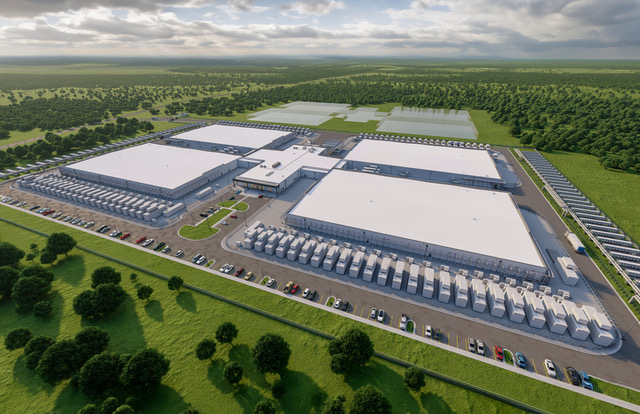
A rendering of the data center that Denver-based Crusoe is building in Abilene, Texas. (Courtesy Crusoe)
Crusoe is powering up.
The Denver-based data center operator recently closed a $600 million capital raise, led by Paypal co-founder Peter Thiel’s Founders Fund, one of the investors in OpenAI.
The company will use the cash to build out a fleet of data centers, co-founder and President Cully Cavness told BusinessDen.
“The ambition is to build gigawatts of AI infrastructure over time,” he said.
Crusoe builds and supplies every aspect of a plant, from energy to servers. Most pre-existing data centers don’t have the capacity to handle artificial intelligence computing, causing record low vacancy. Cavness said the company’s model helps combat this problem by using largely renewable energy in places where there is excess.
In mid-October, the company announced a $3.4 billion deal to build a data center in Abilene, Texas. Cavness declined to comment on the tenant, but The Information reported that Oracle will lease the building and, in turn, sublease it to OpenAI, the creator of ChatGPT.
The Texas center will use wind turbines to run its servers, which Cavness said will help reduce wasted power in a breezy part of the grid. Cavness said it will produce 1.2 gigawatts.
Cavness said the operator moved in last month and that the center is expected to open in the first half of 2025 after construction started in June, which he described as a record time for ground-up data center buildout. It will be one of the largest computing facilities in the world, he said.
“We start with energy first, finding locations where we can bring large amounts of low-cost power to bear quickly, then build out the data center and deploy servers,” he said.
The company also operates another data center in Iceland, which is run by geothermal and hydropower, and has another 15 gigawatts planned in the short term — enough to power 1.5 billion light bulbs.
Cavness said Crusoe is exploring more spots to build in Texas, as well as the northeast, Colorado and Canada.
The raise, which brings the company’s total to around $1.5 billion, also accompanied the public launch of Crusoe Cloud, the business’ service for running artificial intelligence workloads. To access its servers, Crusoe charges a computing price per hour, which is set depending on the length of time and capacity of power needed.
The Cloud servers have been available since 2022, but those were built on a case-by-case basis, Cavness said.
“Historically you’ve had to be a big company with a lot of money to get into that market,” he said.
Crusoe was founded in 2018 by Denverites Cavness and Chase Lochmiller, who went to Kent Denver School in Cherry Hills Village together. Cavness had a background in energy before, and Lochmiller worked in tech. The two combined to originally run a crypto mining operation, which captured excess natural gas from oil fields to power facilities.

Cully Cavness, left, and Chase Lochmiller
But when ChatGPT was publicly released in 2022, Cavness said the company switched gears to capitalize on a coming AI boom.
“We’ve really focused Crusoe around AI-vertical integration, but there’s still a meaningful portion of cash flow coming from our bitcoin mining business,” he said. “It’s just been within the last year we crossed into the majority of revenue coming from AI.”
Crusoe has over 550 employees Cavness said, with 200 in Colorado. Another 120 work in San Francisco, where Lochmiller now lives, and the rest are throughout sites across the world.
The business’ main manufacturing site is in Arvada, the former Easter-Owens Electrical Co. plant that Crusoe bought in 2022. Cavness said the company plans to add around 50 more to its staff of 110. This will enable Crusoe to manufacture 24/7, up from the Monday-through-Thursday schedule it currently operates.
Cavness said Crusoe is cash-flow positive and that its customer base grew seven times in the last 12 months.
Crusoe still runs more than 200 bitcoin mining centers in seven states between North Dakota and New Mexico, making it the largest off-grid bitcoin mining operation in the country, Cavness said. Those facilities capture 30 million cubic feet of flared gas per day, the equivalent of taking about 200,000 cars off the road.

A rendering of the data center that Denver-based Crusoe is building in Abilene, Texas. (Courtesy Crusoe)
Crusoe is powering up.
The Denver-based data center operator recently closed a $600 million capital raise, led by Paypal co-founder Peter Thiel’s Founders Fund, one of the investors in OpenAI.
The company will use the cash to build out a fleet of data centers, co-founder and President Cully Cavness told BusinessDen.
“The ambition is to build gigawatts of AI infrastructure over time,” he said.
Crusoe builds and supplies every aspect of a plant, from energy to servers. Most pre-existing data centers don’t have the capacity to handle artificial intelligence computing, causing record low vacancy. Cavness said the company’s model helps combat this problem by using largely renewable energy in places where there is excess.
In mid-October, the company announced a $3.4 billion deal to build a data center in Abilene, Texas. Cavness declined to comment on the tenant, but The Information reported that Oracle will lease the building and, in turn, sublease it to OpenAI, the creator of ChatGPT.
The Texas center will use wind turbines to run its servers, which Cavness said will help reduce wasted power in a breezy part of the grid. Cavness said it will produce 1.2 gigawatts.
Cavness said the operator moved in last month and that the center is expected to open in the first half of 2025 after construction started in June, which he described as a record time for ground-up data center buildout. It will be one of the largest computing facilities in the world, he said.
“We start with energy first, finding locations where we can bring large amounts of low-cost power to bear quickly, then build out the data center and deploy servers,” he said.
The company also operates another data center in Iceland, which is run by geothermal and hydropower, and has another 15 gigawatts planned in the short term — enough to power 1.5 billion light bulbs.
Cavness said Crusoe is exploring more spots to build in Texas, as well as the northeast, Colorado and Canada.
The raise, which brings the company’s total to around $1.5 billion, also accompanied the public launch of Crusoe Cloud, the business’ service for running artificial intelligence workloads. To access its servers, Crusoe charges a computing price per hour, which is set depending on the length of time and capacity of power needed.
The Cloud servers have been available since 2022, but those were built on a case-by-case basis, Cavness said.
“Historically you’ve had to be a big company with a lot of money to get into that market,” he said.
Crusoe was founded in 2018 by Denverites Cavness and Chase Lochmiller, who went to Kent Denver School in Cherry Hills Village together. Cavness had a background in energy before, and Lochmiller worked in tech. The two combined to originally run a crypto mining operation, which captured excess natural gas from oil fields to power facilities.

Cully Cavness, left, and Chase Lochmiller
But when ChatGPT was publicly released in 2022, Cavness said the company switched gears to capitalize on a coming AI boom.
“We’ve really focused Crusoe around AI-vertical integration, but there’s still a meaningful portion of cash flow coming from our bitcoin mining business,” he said. “It’s just been within the last year we crossed into the majority of revenue coming from AI.”
Crusoe has over 550 employees Cavness said, with 200 in Colorado. Another 120 work in San Francisco, where Lochmiller now lives, and the rest are throughout sites across the world.
The business’ main manufacturing site is in Arvada, the former Easter-Owens Electrical Co. plant that Crusoe bought in 2022. Cavness said the company plans to add around 50 more to its staff of 110. This will enable Crusoe to manufacture 24/7, up from the Monday-through-Thursday schedule it currently operates.
Cavness said Crusoe is cash-flow positive and that its customer base grew seven times in the last 12 months.
Crusoe still runs more than 200 bitcoin mining centers in seven states between North Dakota and New Mexico, making it the largest off-grid bitcoin mining operation in the country, Cavness said. Those facilities capture 30 million cubic feet of flared gas per day, the equivalent of taking about 200,000 cars off the road.


